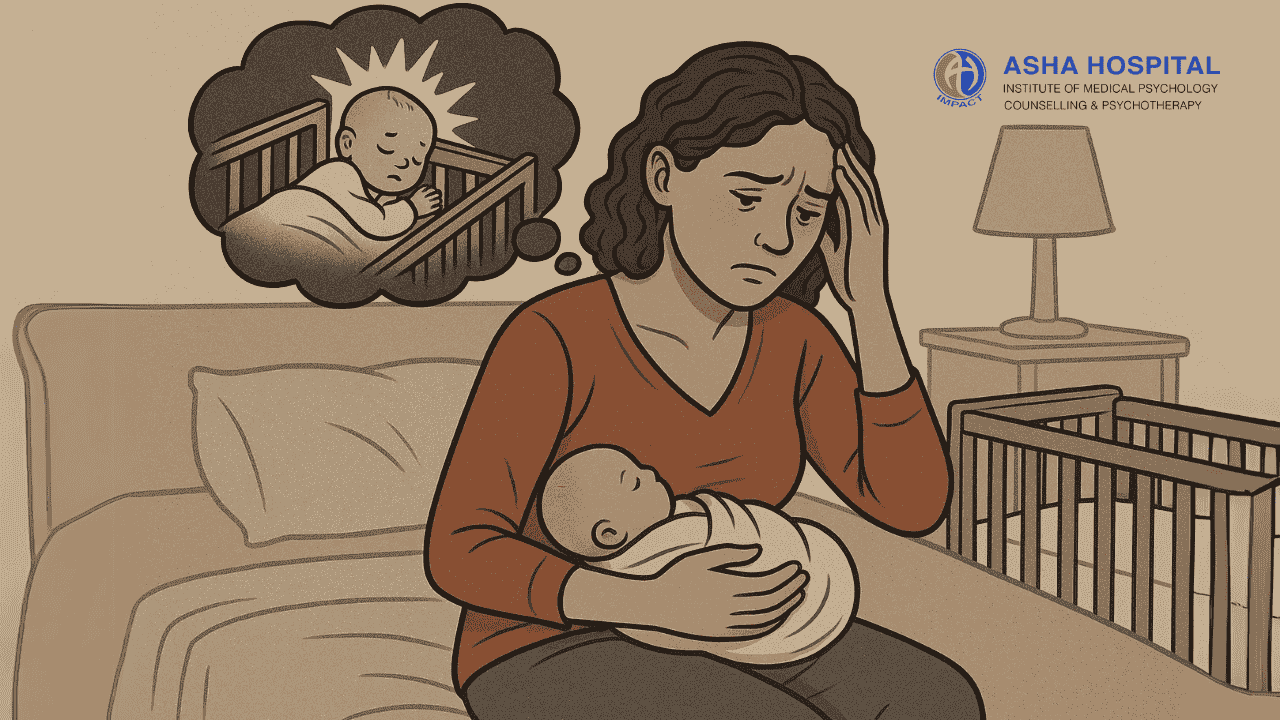Obsessive compulsive disorder (OCD) in women during their pregnancies and in the postpartum are often under-recognized and undertreated, and can have significant impact on the health of the mother, infant, family, and mother–baby relationship.
Women with OCD may experience repetitive and forceful disturbing thoughts centered around the safety and well being of her baby.
The mother may experience
- Repetitive, forceful, anxiety provoking thoughts, most often could be “baby harming” thoughts
- Incapacitating anxiety revolving around her fears
- Palpitations, panic attacks
- Repetitive compulsive acts to manage her anxiety and fears
- Sleep and appetite disturbances
- Difficulty in managing her motherhood period due to these thoughts
It is typically referred to as either Pre natal OCD or Postpartum OCD, solely due to the timing of the symptoms as occurring during pregnancy or after childbirth.

Women who had suffered from OCD prior to pregnancy may experience an exacerbation of symptoms.
First and foremost, mothers are often unwilling to disclose their symptoms due to guilt, shame, and fear of judgment by loved ones or health care providers. For reasons not fully understood, the perinatal period (from pregnancy to 12 months after childbirth) is a particularly vulnerable time for symptoms of OCD to appear, whether they be entirely new symptoms or a re-occurrence of OCD after a period of remission.
Women can also be diagnosed with OCD for the first time during pregnancy and postpartum
Additionally, women who have never been diagnosed with OCD can develop OCD symptoms following childbirth. Major depression is the most common co-occurring disorder, and one study found that over 40% of women with postpartum major depression also experienced repetitive, intrusive, unwanted thoughts of harm befalling their infants.
What Does Perinatal OCD Look Like?
All new mothers experience anxious thoughts. It is considered normal and part of the process of adjusting to the new circumstances. Unfortunately, these anxious thoughts can transform into thoughts and images of harming the baby, such as
“What if I drop the baby over the balcony?”
“ What if I drown or burn the baby in water?”
“ What if the baby dies in my hands? ”
Other thoughts involve harm coming to the baby such as
“What if the baby stops breathing when I’m not watching?”
“ What if the baby catches a deadly illness?”
These thoughts are infact quite disturbing to any mother, imagine the plight of the mother who is suffering from OCD, tormented by these thoughts repetitively all the time.
These thoughts are generally regarded as “harming infant thoughts” and are experienced by mothers as frightening, shameful, and unacceptable. Women with OCD experience their obsessions as highly distressing and unwanted and are horrified by them. These obsessions can also present as intense images of injury, death, or thoughts of physical or sexual harm.
Excessive preoccupation with the safety of the baby or complete avoidance can be a result of obsessive thoughts
Related compulsions include excessive checking behaviors (e.g., frequent checking on a healthy, sleeping infant), over-attachment to the infant, excessive cleaning and washing behaviors, avoidance of the infant, seeking repeated reassurance regarding the infant’s health and well-being, and other similar types of behaviors. Attachment and bonding between mother and infant may become disrupted, with potential negative impacts on infant development.
OCD can lead to problems in infant mother bonding
Difficult attachment between mother and infant can show up in many different ways. At times, the mother has a difficult time being away from her child and may not allow others to care for her child. On the other hand, some women may avoid their infant entirely or refuse to be alone with their infants, for fear of acting out their obsessions and often rely totally on others to care for their child. These behaviors result an impaired mother infant bonding.
Treatment of Perinatal OCD
Like any other period, OCD in perinatal period is also managed with medications and cognitive behavioural therapy (CBT). Seretonin reuptake inhibitors (SSRI) and tricyclic antidepressants (TCA), Benzodiapzepines (BZD) are used commonly to manage OCD symptoms. Other treatments such as repetitive transcranial magnetic therapy, biofeedback relaxation are also effective in managing OCD.
Is Medication Safe?
The decision to take medication while pregnant or breastfeeding can be a difficult one, especially for a woman already grappling with fears of contaminating her child.
First-line medication treatment for OCD involves the use of SSRIs to target OCD symptoms. SSRIs are the most studied medication in pregnancy and lactation. Overall, SSRIs are considered to be relatively safe for use in pregnancy and lactation; when compared with the risks of untreated anxiety and OCD. Medications will be suggested in case of severe symptoms that are getting in the way of their day-to-day functioning.
While SSRIs are thought to be relatively safe, they are not without risks. SSRI use has been linked to preterm delivery and smaller babies, but it is unclear what impacts, is it the medication alone or the severity of the underlying depressive or anxiety symptoms. When the results were restudied after adjusting the confounding factors, risks with SSRI’s were no greater than seen in general population.
In up to 30% of infants exposed to SSRIs in the third trimester, there can be a short term increase in irritability, jitteriness, lethargy. This is a time-limited condition, and infants go on to show normal development through infancy. A close collaborative care approach between the treating pediatrician and Psychiatrist is recommended.
Other medications used in treatment of OCD are tricyclic antidepressants, especially clomipramine. Research suggests mild probability of congenital defects in fetus with certain TCA’s, but when the confounding factors were removed, there is very slight increase in the risk of malformations in the fetus that can be detected with a collaborative care approach.
Using medications during breast feeding:
Very small concentrations of SSRIs are secreted into breast milk, limiting the exposure to the breastfeeding infant. There is no evidence of developmental delay when infants are exposed to SSRIs in breast milk, and they are considered to be compatible with breastfeeding.
While less is known about the safety of other medications commonly used to treat OCD, this does not mean that they are unsafe; rather, this means that there is less published research on their use in the perinatal period.
At the end of the day, women must weigh the pro and cons for themselves, and discuss their options with their psychiatrist or physician. Perinatal OCD is a huge obstacle to maternal bonding and infant development, and in some cases, using medication to help restore that bond maybe may outweigh the risks of the medications themselves.
Other therapies such as repetitive transcranial magnetic therapy, biofeedback relaxation are considered safe augmenting somatic therapies.
Why Choose Asha Women’s Mental Health Clinic for Perinatal OCD Care?
At Asha Women’s Mental Health Clinic, we understand the unique emotional challenges mothers face during and after pregnancy — including the distressing symptoms of Perinatal Obsessive-Compulsive Disorder (OCD). Our dedicated team offers compassionate, confidential, and specialized care tailored to each mother’s needs.
- Expertise in Perinatal Mental Health: Our psychiatrists and psychologists are highly experienced in diagnosing and treating Perinatal OCD with evidence-based approaches.
- Personalized Treatment Plans: We offer Cognitive Behavioral Therapy (CBT), Exposure and Response Prevention (ERP), and safe medication options, all customized to the individual’s condition and motherhood journey.
- Mother and Baby-Friendly Approach: We prioritize both maternal mental health and infant well-being, ensuring a balanced, supportive treatment path.
- Integrated Multidisciplinary Support: Our care team works collaboratively, including psychiatrists, therapists, obstetricians, and pediatricians for holistic care.
- Stigma-Free, Supportive Environment: Asha Clinic provides a safe space where mothers can speak openly, get the right help, and feel truly supported.
If you’re struggling with intrusive thoughts or repetitive behaviors during pregnancy or after childbirth, know that you’re not alone — and help is available at Asha Women’s Mental Health Clinic.
Asha Womens Mental Health Clinic – Visit HereFAQ – Perinatal OCD
What is Perinatal OCD?
Perinatal Obsessive-Compulsive Disorder (OCD) is a type of anxiety disorder that occurs during pregnancy or after childbirth. It involves unwanted, intrusive thoughts (obsessions) and repetitive behaviors (compulsions) aimed at reducing anxiety.
How is Perinatal OCD different from Postpartum Depression?
While both are perinatal mental health conditions, Perinatal OCD is marked by intrusive fears and compulsive actions (e.g., checking the baby repeatedly), whereas postpartum depression typically involves sadness, fatigue, and disinterest. OCD often causes distress due to the nature of the thoughts, but these thoughts are not acted upon.
What are common symptoms of Perinatal OCD?
Common symptoms include:
- Obsessive thoughts about harm coming to the baby
- Repetitive checking or cleaning rituals
- Fear of being a bad parent
- Avoiding certain objects or situations
- These symptoms can be intense but are treatable.
Is it common to have OCD symptoms after childbirth?
Yes, it is more common than many people realize. Studies show that up to 3–5% of new mothers may experience Perinatal OCD. Recognizing the symptoms early and seeking treatment can lead to significant improvement.
How is Perinatal OCD treated at Asha Hospital?
Treatment includes Cognitive Behavioral Therapy (CBT), especially Exposure and Response Prevention (ERP), and medication when necessary. At Asha Hospital, we offer personalized care plans designed by experienced perinatal mental health professionals.


